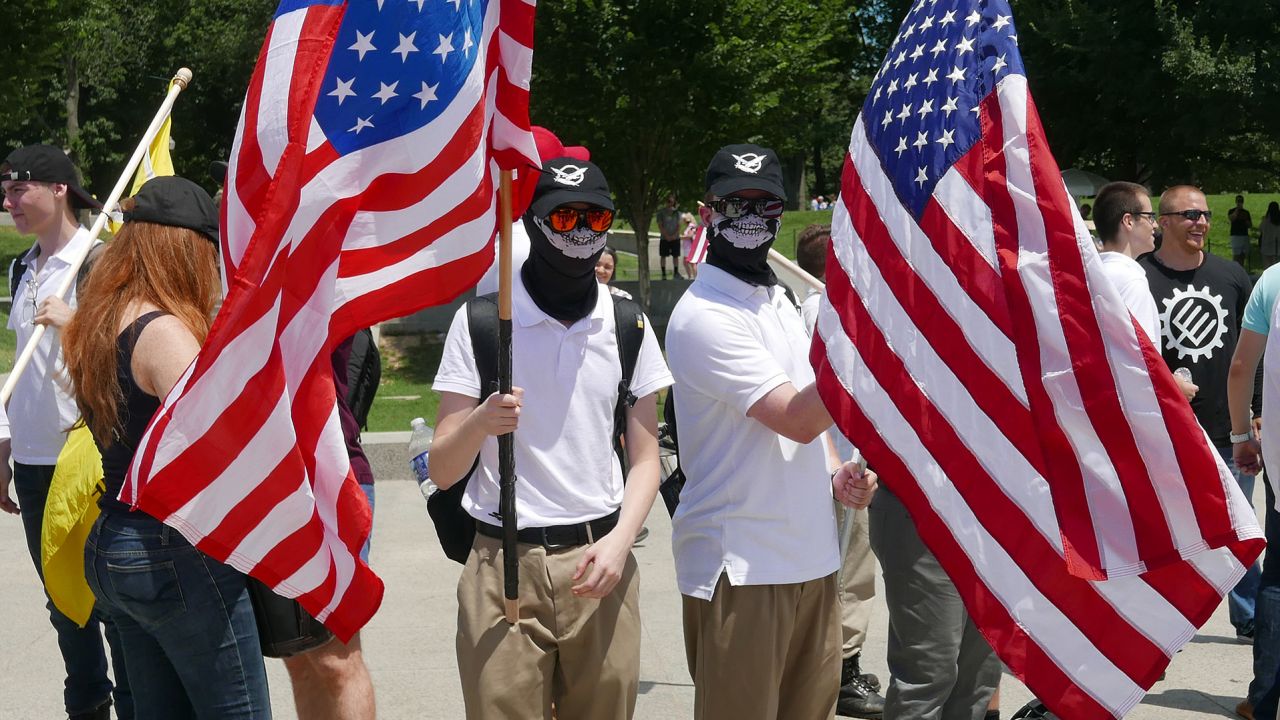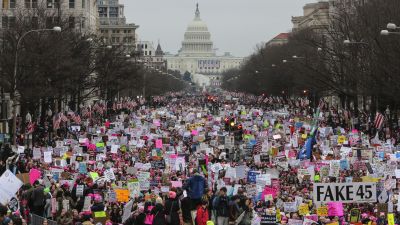
Alt-right demonstrations in Washington, DC, June 25, 2017. (Photo by Susan Melkisethian/Flickr CC 2.0)
Last week we asked our Facebook audience to weigh in on Siva Vaidhyanathan’s op-ed in The New York Times, “Why the Nazis Came to Charlottesville,” about the best way to deal with fraught situations like that in Charlottesville, Virginia, his hometown. Vaidhyanathan writes that he began deliberations with his wife ahead of the protests with concern over confronting a potentially violent group of marchers. They decided to participate in the counterprogramming rather than attending the rally:
“They will have guns,” I said to my wife. “That’s the defining issue for me.” She agreed. The fact that we have a child who is committed to social justice and curious about politics tipped the balance. For her sake, we could not risk putting ourselves in danger, especially when we had an opportunity to enrich her experience with peaceful community engagement.
But in retrospect, Vaidhyanathan believes he made the wrong choice:
Next time I will stand on the street with my neighbors, even at the risk of injury or death. It’s the least I can do to repay those who stood bravely this time. We knew it would be violent. These racists are not a joke. They are not weak or small in number. They are not just pining for attention. This was not a media stunt. They did not come to offer “speech.” They did not come to engage in “debate.” They came here to hurt us.
Here are some of the (lightly edited) answers you gave to our question: How can people effectively protest, resist and voice their opposition without taking to the streets?
William P. Gore’s post garnered the greatest number of replies:
“Unfortunately, I am not a peacemaker. I just choose to pick my battles and make damn sure I am in a tactically defensible position when I do. Going up against armed fanatics carrying clubs and wearing protective gear makes no sense to me if you are not similarly equipped, and even then, what do you win? You’re not going to change their minds, and you might even create some sympathy for them, as unlikely as that may seem. In my opinion, the correct response would have been to stay well away from the scene — and if just one of those guys threatened me, it would be the last threat he ever made.”
Maureen Garrison, Mahesh Kommareddi and Sheila Snipes responded:
“But if we stay home and keep to ourselves, it will make them even bolder. We need to let our opposition be known to them…. Otherwise we will be like the majority of Germans who kept their opinions to themselves.”
“Demonstrations/rallies are understood to be ways to increase membership…. At least according to the FBI.”
“Those people don’t know how to effectively protest. They are evil and angry. I like this better because no more of you will get hurt by these animals. Let them troll the streets making themselves look stupid. I say that the best way to deal with these people, Trump included, is to totally ignore them. This will make them more angry because no one is listening or gives a damn about what they are talking about.”
There were many who opted for engaging elected officials:
“Pay attention, call congressional leaders, write letters, sign petitions, and make donations to organizations that support the issues and positions you believe in.”
“This afternoon, I called my representative’s office after the meaning of Trump’s words sank in. Yesterday, I threw dinner into the oven to braise, ran over to participate in a phone bank, and kept my eye on the clock so dinner did not overcook. Resisting is easy to fit into the nooks and crannies of living.”
— Rebecca Groble Hull
“First and foremost, people need to vote out elected representatives who don’t represent the values of American democracy written in the United States Constitution. And, in their place, vote in candidates that will serve. The ballot is the most powerful weapon we have.”
“Protesting at the protest is not the answer… you need to attack the propagandists by legal means. It’s hate speech. It cannot be tolerated. The Nazi message has been uttered before and should not be encouraged in any form.”
Others suggested head-on confrontation:
“When you witness injustice and racism, STAND UP AND FACE IT TO HELP THE PEOPLE WHO NEED IT!”
“Street protests are newsworthy. This is how freedom-loving Americans discover there are others like themselves concerned about the direction this country is going. Sending emails isn’t noisy enough. The monster must be destroyed before it devours us all. Push ’em back, push ’em back, way back to the last century from whence they sprang.”
Still others advocated for the training, nonviolent, counterprogramming method:
“I think we need to train people in nonviolent communication, and in how to manage our own fear and rattled nervous systems when we are presented with the option of confronting or ignoring racism/sexism/xenophobia, etc. It is scary. It goes against, for many, the tendency to please and to be nonconfrontational. Speaking out against a perpetrator of hate (or a whole mob of them) requires skills that need to be practiced. And always we must be at the ready to defend ourselves from violence, which is also something most of us have never had to do.”
— Félix Peña
“Speak up where you work, where you worship, within your family. But speak up thoughtfully. Read, research, know your points of history and current events, and speak always to the need to apply our loftiest principles to all in our land, and to find a way to work together, not to oppress one group or another out of fear based on hyperbole.”
Still others had novel approaches:
“This is more of a long-game approach — but, in addition to writing, calling, sharing info, promoting vigils, etc., I got the audiobook of The Young People’s History of the United States by Howard Zinn. My children and I are listening to it from start to finish, discussing it frequently, paying special attention to issues germane to this conflict in particular. My children are learning that a thorough understanding of our history and government is nonnegotiable, as are civic engagement and compassion.”
“One single day of NO spending. A strike that will hurt the markets, where the real power lies. No going to the banks, no shopping online or off. NO spending. A 24-hour spending strike.”
— Iam Amy
“Years ago, during the Vietnam War, I belonged to a group that held candlelight vigils. When everyone is dressed nicely, silent, carrying candles and signs that make simple statements about peace, it creates an effect (especially when the sun goes down) that itself is beautiful and peaceful. It does not have to be at the same time as a violent group rally, and it is better if it is not. People need confirmation and hope, they need to know that there are good people in the world who do not need to shout each other down to make a point.”
And then advice from the past:
“‘Nothing needs reforming so much as other people’s habits.’ So said S.L. Clemens. I say, ‘If you don’t protest evil when you can, it will overcome you before you must.’”
Be sure to check out the Southern Poverty Law Center’s “Ten Ways to Fight Hate Community Response Guide.”
You can find many more ways to participate in our Interviews for Resistance series.



